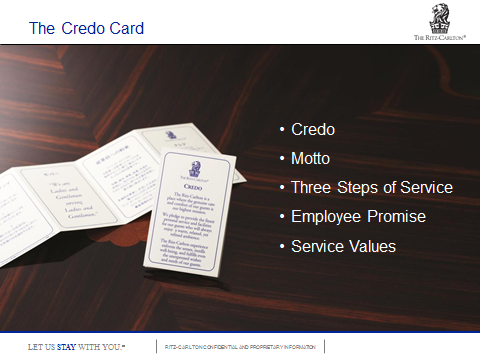Blogrige
The Official Baldrige Blog

The Ritz-Carlton Credo Card is part of employees’ uniform. Image used with permission of the Ritz-Carlton.
The Ritz-Carlton Hotel Company has long demonstrated an organizational culture based on strong customer service. It received the Malcolm Baldrige National Quality Award twice. And it has also earned hotel industry recognition for top customer satisfaction. So when an organization wants to learn how to build and sustain a culture with a strong customer focus and results reflecting service excellence, The Ritz-Carlton is a good source of best practices.
To learn about and share such practices, I recently talked to Jamey Lutz, area performance improvement manager for The Ritz-Carlton Hotel Company. Lutz was director of quality at a Ritz property in Florida when the company received its second Baldrige Award in 1999. In that position, Lutz supervised all property-related quality and customer service initiatives. He also directed hotel training and preparation in advance of the company’s selection as a Baldrige Award recipient that year.
As Lutz explained, The Ritz-Carlton culture is built on a framework of high standards that were established from the company’s outset. “All of our success was built on a very simple framework—the Gold Standards. The Gold Standards encompass The Ritz-Carlton motto (“Ladies and Gentlemen serving Ladies and Gentlemen”); three essential service steps (give a warm welcome, anticipate guest needs, and provide a fond farewell); a credo statement outlining the hotel’s commitment to its guests; and the Employee Promise, a statement expressing the hotel’s commitment to its employees.
Twelve Service Values constitute a final component of the Gold Standards. Those values are conveyed in statements such as “I build strong relationships and create Ritz-Carlton guests for life” and “I own and immediately resolve guest problems.” Lutz stressed that the Gold Standards have continually been “reinforced and enlivened in the company.”
The company reinforces them through such frequent and regular events as daily 15- to 20-minute hotel line-ups consisting of all Ritz-Carlton employees around the world. Besides discussing logistical issues during the line-ups, Lutz explained, the employees review one of the Service Values and “enliven” other components of the Gold Standards through discussion and role playing.
Other practices for reinforcing the company’s core values and standards include mandating that the Credo Card be included as part of employee uniforms.
“We can never allow our core values to be compromised. They are the basics outlining what we stand for,” said Lutz. “If you don’t have the basics down—those minimum standards that you are continuously striving to perfect, you’re never going to realize the long-term goals and aspirations of your company.”
Lutz shared the following tips for other organizations to build and sustain a culture of excellent customer service:
1. Shoot for the heart: Lutz explained that The Ritz-Carlton prioritizes the selection and recruitment of “world-class ladies and gentlemen” (in keeping with its motto). “You can teach someone the technical skills for a position or a role, but you can’t train them to have a sincere, caring attitude for others. Particularly for customer-facing roles and frontline positions, we’re looking for someone with a service mentality. “If you don’t have that genuine desire to serve, it’s not going to come across as authentic, and our guests will know it.”
2. Train and develop employees to be able to sustain high standards for service: For example, the company provides extensive training around the three steps of service outlined in the Gold Standards, said Lutz.
3. Implement rewards and recognition programs for employees to sustain the expected performance in relation to service components: Lutz advises building rewards and recognition components to address the types of customer service behaviors that your organization seeks to have your employees demonstrate.
If a Ritz-Carlton employee is observed doing something well, he or she can receive a First-Class Card as a form of kudos and recognition. Such cards also give employees opportunities to win perks such as a free dinner or movie ticket through regular drawings. At a higher level, The Ritz-Carlton’s “Five Star” award program provides sizeable cash rewards for those who demonstrate internal or external service excellence on multiple occasions.
4. Use the Baldrige Excellence Framework for ongoing improvement: Beyond the basic cultural framework provided by the Gold Standards, the Baldrige Excellence Framework “gives us a blueprint for ongoing success,” said Lutz. “Baldrige provides a framework to get to a higher level of organizational performance.”
He affirmed that the benefit of using the Baldrige framework is more fundamental than being recognized for winning the prestigious national award. A key benefit is that an organization “establishes a baseline of where you are as a company,” he said. The feedback that The Ritz-Carlton got the first time it applied for the Baldrige Award was essential to building its understanding of its performance, he added.
Lutz also offered the insight that an organization’s quest to build a culture of excellence in customer service is “a marathon, not a sprint.” “You can’t build a world-class culture overnight,” said Lutz. “It has to be built and reinforced from the highest levels of the organization. It’s an ongoing, unrelenting commitment to excellence, and it never ends.”





